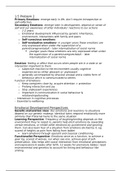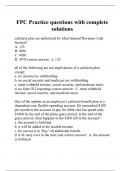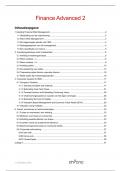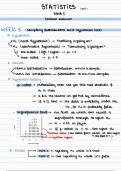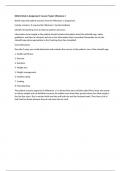1.5 Problem 2
Primary Emotions- emerge early in life, don’t require introspection or
self-reflection
Secondary Emotions- emerge later in development, depend on sense of
self and our awareness of other individuals’ reactions to our actions
- 1-2 years
o Emotional development influenced by genetic inheritance,
environment, interactions with family and peers
o Self-conscious emotions
o Self-evaluative emotions- in younger years these emotions are
only expressed when under the supervision of a
parent/caregiver/adult – later internalization of social norms
younger years these emotions are only expressed when under
the supervision of a parent/caregiver/adult – later
internalization of social norms
Emotion- feeling or affect that occurs when people are in a state or an
interaction important to them
o subjective reaction to the environment usually cognitive
experienced as either pleasant or unpleasant
o generally accompanied by physical arousal and a visible form of
behaviour which is communicated to others
Function of Emotions
o Keep caregivers close by, acquire attention > protection
o Prolong interaction and joy
o Stop unpleasant experiences
o Important in communication in social behaviour &
relationships/bonding
- Interwoven in cognitive processes
- Essential to wellbeing
Emotional Development Perspectives
Genetic-maturation view- Our emotions and reactions to situations
depend on our genetic makeup: identical twins respond emotionally more
similarly than fraternal twins to the same situation
Learning Perspective- Frequency of laughing/smiling depends on the
environment they’re raised in, parents help elicit emotions by rewarding
certain emotions, or inhibit other emotions by punishment and ignoring
them. Can also learn fear of a situation from emotions elicited by it, eg.
scared of heights as pain from falling from ladder
learn emotions through operant and classical conditioning
Functionalist Perspective- Emotions serve as a function, to achieve a
goal. Eg. scared of wolves, run when see one, achieve goal of self-
preservation. Also helps with social interaction from emotional perceptions
and expressions 6 weeks after birth, 12 weeks for premature babies: need
environmental and genetics to account for timing and behaviour like
smiling
, Babies Smiles
Reflex smile- a smile of a new-born that’s spontaneous and from internal
stimuli
3-8 weeks smile to external stimuli
4 weeks, focus on eyes
8-9 weeks, focus on elicitors mouth and eyes
3 months, smile selectively at familiar faces (signals pleasure,
not just arousal)
o Caregiver sees it as sign of pleasure, pays more attention to baby,
increasing survival rate of baby
Social Smile- response to external stimulus, typically a face
o 4-6 weeks
Anticipatory smile- pre-emptive smile at object, turn smile to adult
6-12 months Duchenne smile: eye constriction, mouth open in highly
enjoyable situations
-new-born girls smile more than boys
Duchenne smile= sincere smile mostly as a reaction to mother
Display smile= Duchenne + jaw dropping (extreme joy)
o girls smile more than boys, perhaps preparing for social
interaction
o amount of smiling varies in cultures
o stimuli eliciting laughs, changes, social and tactile stimuli less
effective: auditory and visual, more effective
o laugh at self more as grow older
o with age, becomes a social event
Infancy
Primary and secondary emotions
o Basic cry- rhythmic pattern, cry, brief break, higher pitched cry,
break, cry. Sometimes elicited by hunger
o Angry cry- variation of basic cry, excess air forced through vocal
cords
o Pain cry- sudden long, initial loud cry. Breath holding; no preliminary
moaning
Fear
Fear typically shows at 6 months and peaks at 18months.
Abused/neglected show fear at 3 months
Stranger anxiety- infant shows fear and wariness of strangers
o Most frequent expression of fear
o Wary at 6 months
o Fearful at 9, escalates until aged 1
Anxiety varies on individual, context, stranger characteristics
o Less anxiety if: stranger in familiar setting, sitting in mothers laps,
child strangers, friendly/outgoing/smiling strangers
Separation protest- infants anxious about leaving caregivers so cry
o Peaks at 15months
-gradually inhibit/minimise intensity/duration of emotional reactions
-soothing caregivers help reduce stress and regulate infants emotions
Primary Emotions- emerge early in life, don’t require introspection or
self-reflection
Secondary Emotions- emerge later in development, depend on sense of
self and our awareness of other individuals’ reactions to our actions
- 1-2 years
o Emotional development influenced by genetic inheritance,
environment, interactions with family and peers
o Self-conscious emotions
o Self-evaluative emotions- in younger years these emotions are
only expressed when under the supervision of a
parent/caregiver/adult – later internalization of social norms
younger years these emotions are only expressed when under
the supervision of a parent/caregiver/adult – later
internalization of social norms
Emotion- feeling or affect that occurs when people are in a state or an
interaction important to them
o subjective reaction to the environment usually cognitive
experienced as either pleasant or unpleasant
o generally accompanied by physical arousal and a visible form of
behaviour which is communicated to others
Function of Emotions
o Keep caregivers close by, acquire attention > protection
o Prolong interaction and joy
o Stop unpleasant experiences
o Important in communication in social behaviour &
relationships/bonding
- Interwoven in cognitive processes
- Essential to wellbeing
Emotional Development Perspectives
Genetic-maturation view- Our emotions and reactions to situations
depend on our genetic makeup: identical twins respond emotionally more
similarly than fraternal twins to the same situation
Learning Perspective- Frequency of laughing/smiling depends on the
environment they’re raised in, parents help elicit emotions by rewarding
certain emotions, or inhibit other emotions by punishment and ignoring
them. Can also learn fear of a situation from emotions elicited by it, eg.
scared of heights as pain from falling from ladder
learn emotions through operant and classical conditioning
Functionalist Perspective- Emotions serve as a function, to achieve a
goal. Eg. scared of wolves, run when see one, achieve goal of self-
preservation. Also helps with social interaction from emotional perceptions
and expressions 6 weeks after birth, 12 weeks for premature babies: need
environmental and genetics to account for timing and behaviour like
smiling
, Babies Smiles
Reflex smile- a smile of a new-born that’s spontaneous and from internal
stimuli
3-8 weeks smile to external stimuli
4 weeks, focus on eyes
8-9 weeks, focus on elicitors mouth and eyes
3 months, smile selectively at familiar faces (signals pleasure,
not just arousal)
o Caregiver sees it as sign of pleasure, pays more attention to baby,
increasing survival rate of baby
Social Smile- response to external stimulus, typically a face
o 4-6 weeks
Anticipatory smile- pre-emptive smile at object, turn smile to adult
6-12 months Duchenne smile: eye constriction, mouth open in highly
enjoyable situations
-new-born girls smile more than boys
Duchenne smile= sincere smile mostly as a reaction to mother
Display smile= Duchenne + jaw dropping (extreme joy)
o girls smile more than boys, perhaps preparing for social
interaction
o amount of smiling varies in cultures
o stimuli eliciting laughs, changes, social and tactile stimuli less
effective: auditory and visual, more effective
o laugh at self more as grow older
o with age, becomes a social event
Infancy
Primary and secondary emotions
o Basic cry- rhythmic pattern, cry, brief break, higher pitched cry,
break, cry. Sometimes elicited by hunger
o Angry cry- variation of basic cry, excess air forced through vocal
cords
o Pain cry- sudden long, initial loud cry. Breath holding; no preliminary
moaning
Fear
Fear typically shows at 6 months and peaks at 18months.
Abused/neglected show fear at 3 months
Stranger anxiety- infant shows fear and wariness of strangers
o Most frequent expression of fear
o Wary at 6 months
o Fearful at 9, escalates until aged 1
Anxiety varies on individual, context, stranger characteristics
o Less anxiety if: stranger in familiar setting, sitting in mothers laps,
child strangers, friendly/outgoing/smiling strangers
Separation protest- infants anxious about leaving caregivers so cry
o Peaks at 15months
-gradually inhibit/minimise intensity/duration of emotional reactions
-soothing caregivers help reduce stress and regulate infants emotions


